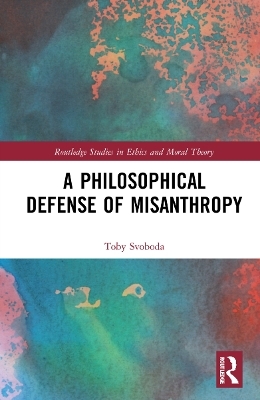
A Philosophical Defense of Misanthropy
Seiten
2022
Routledge (Verlag)
978-1-032-02998-6 (ISBN)
Routledge (Verlag)
978-1-032-02998-6 (ISBN)
This book argues that it can be both reasonable and appropriate to adopt a certain kind of misanthropy. The author defends a cognitivist version of misanthropy, an attitude whose central feature is the judgment that humanity is morally bad.
Misanthropy is often dismissed on moral grounds. Many people hold that malice toward human persons is problematic and vulnerable to moral objections. In this book, the author advocates for cognitivist misanthropy. He defends an Asymmetry Thesis, according to which a morally bad deed carries more weight than a morally good deed, even if the harm of the former is exactly equal to the benefit of the latter. He makes the case that being misanthropic in the cognitivist sense is morally permissible and compatible with a broad range of moral reasons for action. He also considers the role of misanthropy in environmental thought, arguing that charges of misanthropy against certain "non-anthropocentric" views do not have the force they are typically thought to carry. Finally, the author investigates the practical implications of adopting cognitivist misanthropy, asking what living with such an attitude would involve.
A Philosophical Defense of Misanthropy will appeal to researchers and advanced students working in ethics and the philosophy of human nature.
Misanthropy is often dismissed on moral grounds. Many people hold that malice toward human persons is problematic and vulnerable to moral objections. In this book, the author advocates for cognitivist misanthropy. He defends an Asymmetry Thesis, according to which a morally bad deed carries more weight than a morally good deed, even if the harm of the former is exactly equal to the benefit of the latter. He makes the case that being misanthropic in the cognitivist sense is morally permissible and compatible with a broad range of moral reasons for action. He also considers the role of misanthropy in environmental thought, arguing that charges of misanthropy against certain "non-anthropocentric" views do not have the force they are typically thought to carry. Finally, the author investigates the practical implications of adopting cognitivist misanthropy, asking what living with such an attitude would involve.
A Philosophical Defense of Misanthropy will appeal to researchers and advanced students working in ethics and the philosophy of human nature.
Toby Svoboda is an associate professor of philosophy at Fairfield University, USA. He is the author of The Ethics of Climate Engineering (Routledge, 2017) and Duties Regarding Nature (Routledge, 2015).
1. Introducing Misanthropy 2. The Example of Schopenhauer 3: The Ethics of Misanthropy 4. Arguing for Cognitivist Misanthropy 5. Objections to Cognitivist Misanthropy 6. Misanthropy and Non-Human Nature 7. Living as Misanthropists
| Erscheinungsdatum | 29.04.2022 |
|---|---|
| Reihe/Serie | Routledge Studies in Ethics and Moral Theory |
| Verlagsort | London |
| Sprache | englisch |
| Maße | 152 x 229 mm |
| Gewicht | 226 g |
| Themenwelt | Geisteswissenschaften ► Philosophie ► Ethik |
| ISBN-10 | 1-032-02998-6 / 1032029986 |
| ISBN-13 | 978-1-032-02998-6 / 9781032029986 |
| Zustand | Neuware |
| Haben Sie eine Frage zum Produkt? |
Mehr entdecken
aus dem Bereich
aus dem Bereich
unsere kollektive Verantwortung
Buch | Hardcover (2023)
wbg Theiss in Wissenschaftliche Buchgesellschaft (WBG) (Verlag)
35,00 €


